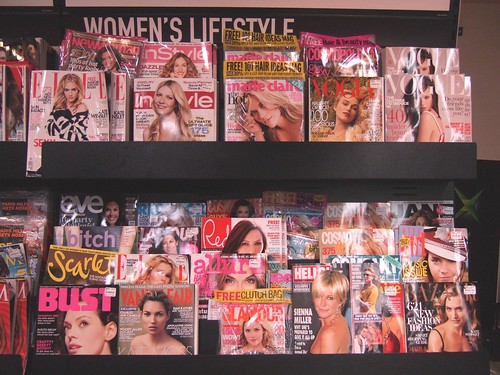
It is sometimes assumed that stereotypes are the opposite of the truth if only by virtue of the fact that we know innumerable exceptions. But there is further than that. Furthermore, we might add, they are mechanics of oppression because they insist on not just whole classes of people, but every individual comprising that class, being defined by stereotype.
It may, however, be possible to think that they contain potentially problematic, over-confining truths. Let me see. There are certain truths in the Fanthorpe poem, as I can immediately verify by looking along the magazine shelves of my local One-Stop Shop. UAF wrote the poem before 1978 and it seems little has changed. The specialist magazines are as they are, as they were. What I notice about the women's magazines is that every one of them has the face of a woman on it. That hasn't changed either. It is an attractive, intelligent looking face, but that is what it is: the face of a woman. It is not the face of the reader: it is, I would guess, the idealised location of those 'impossible junctions / Of being a woman'. It just happens to look like a face.
UAF's poem does not offer a critique of that face, it simply states the existence of the unexamined magazines. She doesn't even look at them. She doesn't note that they are, each of them represented by a face - and, what is more, a troublingly similar face in most cases - she ignores it as an object. It is the location that matters.
She does, however, offer a critique of the men's specialist magazines. They present, through their titles, and through her comments on them, an image of men as slightly ludicrous, obsessive and vainglorious ("the impossible triumphs... before he has even bought his magazine, / Let alone a guinea-pig.". (We will find the same kind in Carol Ann Duffy's Feminine Gospels).
The "golden arena / Of dedicated action" remains ambiguous, and I want to return to that. It seems important to me. There is, I note, less ambiguity about "the single track". Dimwits. Children.
The stereotypical truth offered here (as evidenced by the magazines) is that men are specialists, dreamers and obsessives; whereas women inhabit a holistic world, but one which is, at the same time, impossible.
Amis says much the same in fact, though his phrase, the "ladies' choice", looks not only dated but patronising, even in its ironic bluffness. Amis ends the poem with the image of the male poet trying desperately hard to write a love poem and failing, while his female counterpart finds it easy. Amis criticises the pompousness of the male poets but his deeper beef is with the women who find love 'easy' to write. - That is, in effect, an accusation of shallowness.
If Amis were to look at the ranks of women's magazines along the shelf, he would, I imagine, murmur something like: 'Infinite self-obsession!' under his breath. If he were truly a contemporary he might modify that to 'infinite self-image obsession', and that, he would argue, was the chief of the impossible junctions in UAF's poem.
Amis is an old male fart, of course, but an old male fart is not necessarily a fool. He would need to be convinced that those "impossible junctions" were not innate or self-made, but were the product of... well, a lot of things. Maybe the woman too is a "cavey-breeder" at heart. Maybe she would be as happy in "the bastard trench" as a man, were it not for... well, a lot of things.
I say, "well.. a lot of things", because I know no more than anyone else about them in any authoritative way, and that is where the sharper debates still lie. I wouldn't want to go into that corner unarmed and I don't feel like heavy-duty fighting.
All I want to say for now, very lightly armed, is that good poems are rarely written by stereotypical men or women. I wouldn't say U.A. Fanthorpe was a stereotypical woman, but then neither are Carol Ann Duffy, Elizabeth Bishop, Sylvia Plath, Alice Oswald, or indeed any female poet. But no male poet (or indeed competition judge) is a stereotype either, unless you want to set them up as such.
So, one more post on this topic, before slotting in the final Cloud Talk excerpt.

2 comments:
Odd conjunctions on women's body images in these same dated posts, by writers much more articulate about why women are angry than I am. I know you don't like angry women, George, and I don't blame you, but these writers have a point. Best.
Twisty
http://blog.iblamethepatriarchy.com/2010/03/30/scum-not-the-real-enemy/
Duchesse
http://passagedesperles.blogspot.com/2010/04/tish-rocks-les-rondes-and-reaction.html
I think that's the part covered by my, ".. well, a lot of things", Dana.
For sure, there are many other things, but my sense of it is that that is not a lot of simple things but a lot of very complicated things, and that shouting at the simple binaries is not one tenth as nuanced (to use a contemporary verbed-noun) as just ordinary everyday life is, and I mean stuff like getting born, growing up, sickening, and dying. None of it very simple at all.
I seem to have been going through the eternal mill of being under permanent suspicion (the item that parked this group of posts) ever since I turned about twenty-five. It is as if I had to produce my ID for even baseline acceptability at every junction. I don't mean I intend getting angry - though occasionally I might, it is rarely intentional - just very politely and courteously not conforming and not genuflecting every time a woman checks me over for political health and safety reasons.
I hope to remain a courteous, reasonably intelligent, intending-to-be-generous, piece of scum. If I cannot be acceptable by means of courtesy, intelligence and generosity, I have no desire to be acceptable to the oppressed class.
Post a Comment